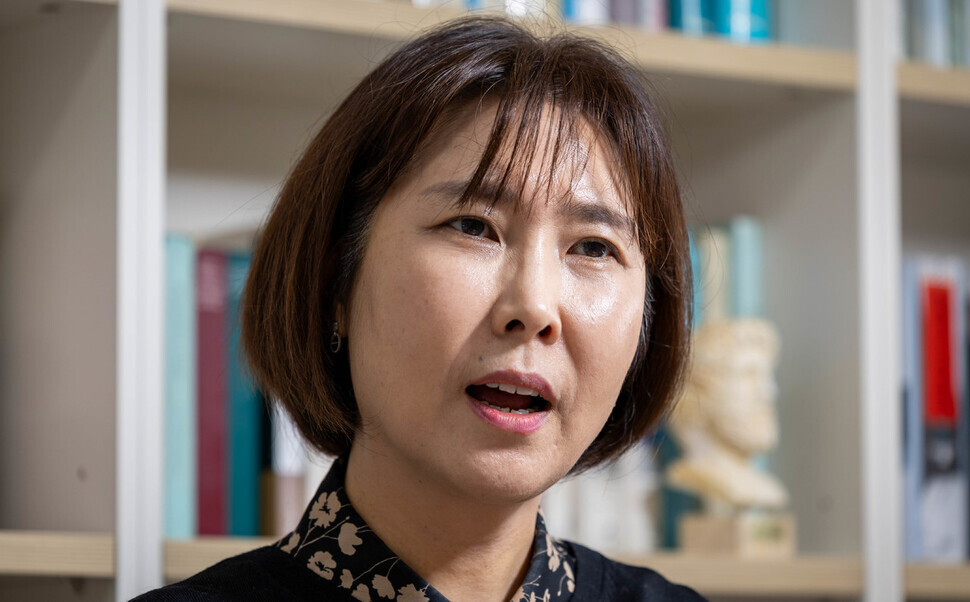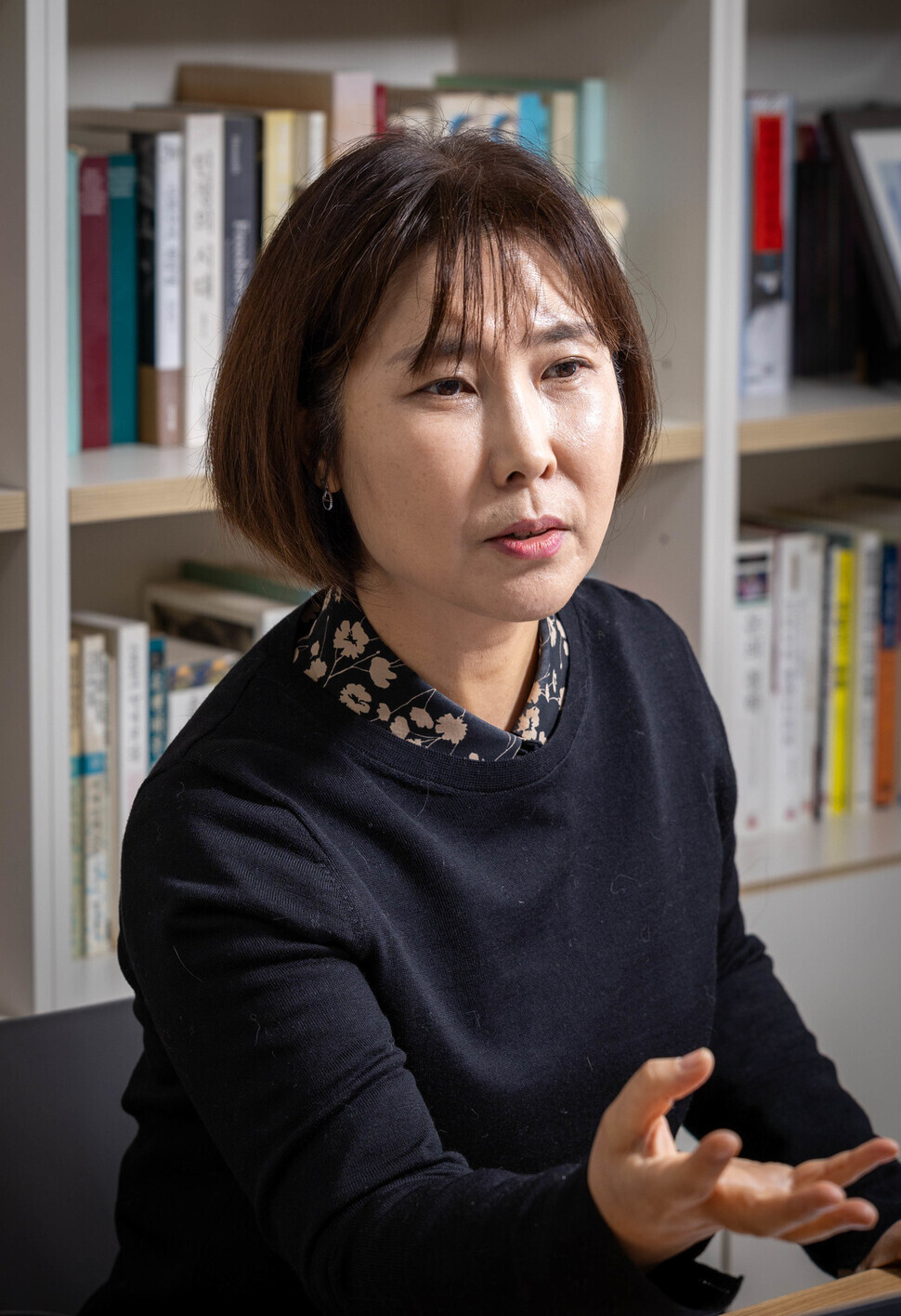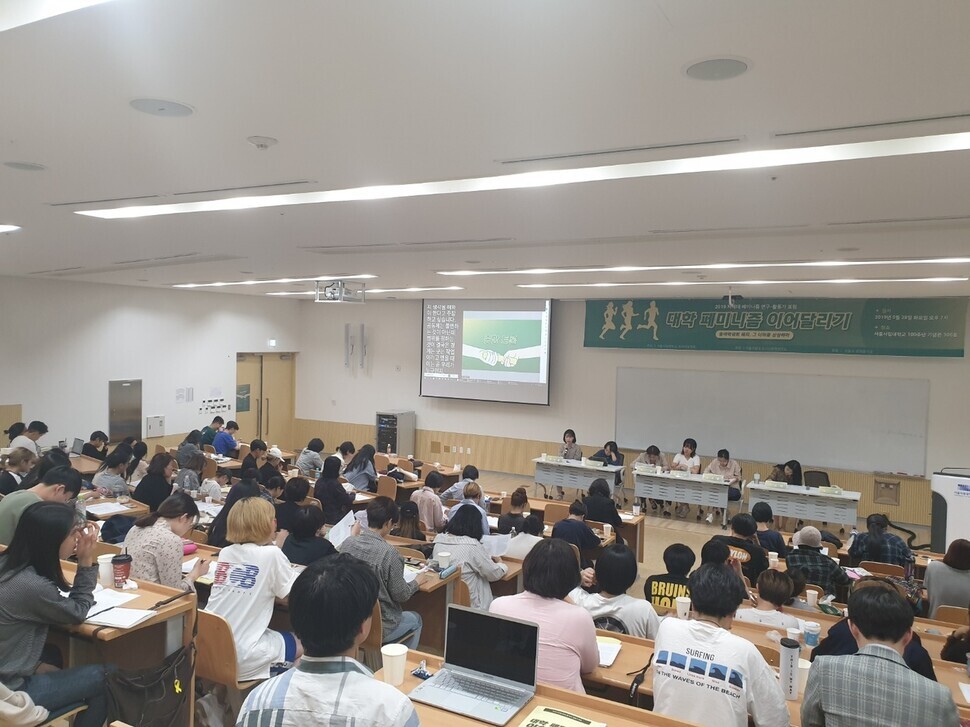hankyoreh
Links to other country sites 다른 나라 사이트 링크
[Interview] In age of misogynist crisis, Korean feminism must reconnect with broader struggles

The largest intellectual town square for women’s studies in South Korea, the Korean Association of Women’s Studies celebrates its 40th year in 2024. With over a thousand members, KAWS, as the association is familiarly known, regularly hosts big and small events year-round, from academic conferences in the spring and fall to summer camp programs. The organization is known for pursuing sensitive and controversial subjects.
The past 10 years of the digital revolution have propagated feminism, allowing women’s studies to evolve in various ways. Yet it remains to be seen as to whether the past decade could be seen as one of “progress.” Women’s studies in Korea have adopted a skeptical stance regarding “progress,” choosing to focus more on heralding transitions in an era of rapid climate change and ecological crises, widening economic disparities, and various natural disasters.
Lee Hyun-jae, a professor at the Institute for Urban Humanities at the University of Seoul who was recently appointed as the KAWS chairperson, says she feels a “heavy burden” on her shoulders. An expert on feminist philosophy, Lee studied under Axel Honneth at Goethe University Frankfurt. She received her doctorate after writing her thesis on the philosophy of recognition and feminism. The Hankyoreh met with Lee at the University of Seoul on Feb. 13.

Hankyoreh: Tell us about what KAWS has accomplished throughout the past 40 years.
Lee: The first 10 years were when we began to flourish. Our first conference was held in 1985. It was titled, “Perspectives on Women in the Three Major Religions.” It was an attempt to create a new kind of women’s studies that incorporated Korean history and the Korean perspective, as opposed to simply importing Western women’s studies. We continued to hold academic conferences from that point, including “Patriarchy in Korean Society” (1986), “Sex and Education,” (1987), and “Gender Research” (1989).
In 2005, we hosted Asia’s first International Interdisciplinary Congress on Women, publishing 2,087 dissertations. At this point, we focused on contentious topics such as sex workers and prostitution. We also started the conversation on the place of sexual minorities. The past 10 years have been focused on the backlash to feminism, and the sort of “feminism reboot” Korea has seen. People say women have made strides in the professional realm, but the gender pay ratio still has women earning 64 won for every 100 a man earns. Feminism in academia focuses on cultural analyses, but when faced with issues of psychoanalysis and postmodernism, women living in the digital era are faced with a strange monster called misogyny.
Hankyoreh: You could say it’s a difficult time to run KAWS.
Lee: It’s not the best of times. The current president ran on a pledge to scrap the Ministry of Gender Equality and Family during his campaign. And the word “women” is disappearing from various local women’s foundations. That’s because public perception of any entity for women is becoming increasingly negative. We are living in the era of backlash. In Susan Faludi’s book, “Backlash,” she claims that anti-feminism emerges not when women have achieved true equality but when it’s almost there.
The political misappropriation of feminism
Feminism, or women’s studies, has been a hot issue in Korea for the past 100 years. Combative feminist writers and activists like Na Hye-sok became sick and penniless, eventually facing a lonely death. People like Kim Ir-yeop gave up altogether on the material world and became Buddhist nuns. Jeon Hye-rin, although she wasn't technically a feminist, also met a tragic end. Tragedy and misery were the lot of Korean female activists and writers.
The feminists that survived were publicly derided as materialists mostly from the upper-middle class, gold diggers, vanity whores, and hypocrites. Even among progressives, any reports that focused on sexual violence were lambasted as “trying to pick up shells when the tsunami is coming.” In politics, feminism has become a public punching bag. In the last presidential election, candidates on both sides of the political aisle called for an end to “fanatical feminism” (Lee Jae-myung) and for feminism to “be a healthier version of itself” (Yoon Suk-yeol).
Hankyoreh: Feminism is political, but the use of feminism by politicians is a different matter. Politicians often use feminism as a tool of division.
Lee: Under the Yoon Suk-yeol administration, “gender” has been pointed to as a cause of social conflict. That’s because they’re focusing only on surface-level phenomena, while disregarding the underlying competition and uncertainty in society. The Democratic Party has appeared to be uncomfortable and quiet about issues relating to feminism after the #MeToo accusations against prominent politicians in their party.
Hankyoreh: Even women who entered politics after trailblazing in the women’s movement
have distanced themselves from feminism for the sake of their own political survival.
Lee: I have to ask, have women’s politics already failed? Should we call it a failure? The women who have entered politics in the past few years haven’t had long political careers yet, so they may have encountered difficulties due to a lack of experience.
I think it’s kind of inevitable that they would end up isolated. As [Hallym University sociology professor and 35th KAWS president] Shin Gyeong-a has pointed out, it’s tough for women to break into the “old boys’ network.” And just as right-wing populism based on politics of hate has been on the ascendancy in the US with Donald Trump’s combination of misogyny and xenophobia, I think we’re seeing a similar phenomenon in Korea.
Hankyoreh: There have been renewed calls from politicians for women to be subject to compulsory military service, the same as men.
Lee: What we’ve been hearing from politicians lately is a response to the “fairness” discourse among young men. Those young men don’t want to go into the military. Since they all have to, they insist that the fact that women don’t have to perform military service is reverse discrimination, and they attack feminists as a selfish group.
These days, the only way to live as a human being in this world is to live a successful life. Since they’re talking about reverse discrimination, some younger women have just agreed that women should also have to serve.
But when you have this kind of reacting and re-reacting going on with the same basic framework in place, there’s no consideration as to how to proceed toward a just society. Politicians, for their part, should stop using gender as a wedge issue and come up with other policy ideas, such as changing military service obligations into civic obligations.
Hankyoreh: The topics of “care” and “care work” have also been making the rounds among politicians.
Lee: Care needs to be an issue for all members of the public. The approach of having third-world women fill the gap with low-wage care labor without them receiving civil rights is an attempt to solve the care issue through someone else’s sacrifice. Korean society today should be reducing working hours and putting “care” at the center of policies in every area, viewing it as an issue for all citizens as it tries to resolve the low birth rate and aging population issues.
Hankyoreh: Digital feminism has changed at a fast rate over the past 10 years.
Lee: KAWS has been working urgently to connect feminist discourse with online environments, but we haven’t had enough success. Members of the young generation have a digital native mindset, but researchers haven’t really sensed the seriousness of issues with things like illegal photography, gaslighting, and online sexual abuse.
Between the late 1990s and 2000s, there was a trend of “post-” discourse and research into psychological theory, but it was too inaccessible, and I think it was only weakly connected with everyday issues. In particular, the gap between misogyny in the digital world and advanced, complex feminist theory hasn’t been bridged enough.

Hankyoreh: It also seems like the so-called “young young feminists” have been unaware of women’s studies and feminism.
Lee: I’m sure it’s been a confusing experience for young feminists building their own forms of feminism in digital environments. The misogynistic expressions used to objectify women on male-centered sites like Ilbe Storehouse or DC Inside have been severe enough to trigger a backlash from women, who began looking to feminism for the language to push back.
It was around 2015 that we started seeing feminist campaigns on social media with the #IAmaFeminist hashtag. Some of those women have defined themselves as “born feminists,” and I don’t think there have been enough efforts to relate that to existing feminist discourse.
Hankyoreh: People were also disconcerted by the emergence of “Womad.”
Lee: Up until 2015, the website Megalia was the main mirroring platform in response to misogynistic language. Womad broke off from Megalia in 2016, and there was also the emergence of trans-exclusionary radical feminism (“TERF”), which ostracizes refugees and transgender people. As people started grappling with this on the ground, some of them entered universities and began pursuing women’s studies more intensely, while others were active on the outside, distancing themselves from academic women’s studies. The important thing is that we cannot support the TERF position. That much is clear. Solidarity with minorities is a central part of feminism.
Hankyoreh: Another new phenomenon is the emergence of “success-oriented feminists.”
Lee: Those are neoliberal feminists. We’ve seen a current of neoliberal feminism that contrasts with the orientation of existing women’s studies. In the US, the prominent neoliberal feminists have been CEOs and celebrities. This phenomenon represents a break with the lineage that is disconnected from the things feminism has been discussing to date. The orientation of feminism is solidarity among vulnerable people who have been victimized under a binary gender order. Why do you think feminism is associated with things like veganism, animal rights, or disability studies? There is no connection between feminism as solidarity among the vulnerable and its instrumental use as a way of succeeding “just like men,” focusing on only “females” or “women” as subjects while ignoring the feminism that has been a guiding force in academic methodologies from a minority perspective.
Hankyoreh: When the inaugural chairperson of KAWS, Yoon Chung-ok, founded the association, it was as a continuation of discourse on the “development of women’s human resources.”
Lee: That was rooted in practical issues at the time. You can’t dismiss discussions that relate to feminist leadership. Back then, it was clearly expressed that women’s studies were not about women’s issues alone but a field that involved analyzing structures. Later on, it would ally itself with female workers, and while there have been various missteps, I don’t think it’s lost sight of its course in the larger scheme.
Hankyoreh: KAWS itself is oriented toward practical engagement.
Lee: In the past two or three years, the association has issued two statements, one calling for the enactment of an anti-discrimination act (equality act) and one opposing the abolition of the Ministry of Gender Equality and Family. I think these show how women’s studies have been an agent of praxis. Society is going backward. Feminism needs to pursue academic research and also involve itself with practical matters on the ground.
Hankyoreh: It sounds like KAWS has a lot of work ahead of it.
Lee: Feminists are exploring new vocabulary to usher in a new world. A big part of that involves examining how to reconsider relationships and how it may be possible to reconnect. We need to focus on this course and consider relationships without exclusion as we work to find answers.
By Lee You-jin, senior staff writer
Please direct questions or comments to [english@hani.co.kr]
Editorial・opinion
![[Column] Will Seoul’s ties with Moscow really recover on their own? [Column] Will Seoul’s ties with Moscow really recover on their own?](https://flexible.img.hani.co.kr/flexible/normal/500/300/imgdb/original/2024/0513/5917155871573919.jpg) [Column] Will Seoul’s ties with Moscow really recover on their own?
[Column] Will Seoul’s ties with Moscow really recover on their own?![[Column] Samsung’s ‘lost decade’ and Lee Jae-yong’s mismatched chopsticks [Column] Samsung’s ‘lost decade’ and Lee Jae-yong’s mismatched chopsticks](https://flexible.img.hani.co.kr/flexible/normal/500/300/imgdb/original/2024/0512/3017154788490114.jpg) [Column] Samsung’s ‘lost decade’ and Lee Jae-yong’s mismatched chopsticks
[Column] Samsung’s ‘lost decade’ and Lee Jae-yong’s mismatched chopsticks- [Correspondent’s column] The real reason the US is worried about Chinese ‘overcapacity’
- [Editorial] Yoon’s gesture at communication only highlights his reluctance to change
- [Editorial] Perilous stakes of Trump’s rhetoric around US troop pullout from Korea
- [Guest essay] Preventing Korean Peninsula from becoming front line of new cold war
- [Column] The state is back — but is it in business?
- [Column] Life on our Trisolaris
- [Editorial] Penalties for airing allegations against Korea’s first lady endanger free press
- [Editorial] Yoon must halt procurement of SM-3 interceptor missiles
Most viewed articles
- 1Seoul’s plan to adopt SM-3 missiles is like wanting a sledgehammer to catch a fly
- 2[Column] Samsung’s ‘lost decade’ and Lee Jae-yong’s mismatched chopsticks
- 3[Correspondent’s column] The real reason the US is worried about Chinese ‘overcapacity’
- 4Korea poised to overtake Taiwan as world’s No. 2 chip producer by 2032
- 560% of young Koreans see no need to have kids after marriage
- 6[Editorial] Yoon’s gesture at communication only highlights his reluctance to change
- 7Yoon voices ‘trust’ in Japanese counterpart, says alliance with US won’t change
- 8Yoon rejects calls for special counsel probes into Marine’s death, first lady in long-awaited presse
- 9S.K.-Japan joint history project to be revived
- 10Former President Roh Tae-woo, mastermind of 1979 military coup, dies at 88